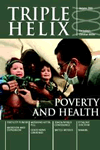'Doctors warned against preaching to patients' was the headline provoked by the Spring edition of Triple Helix.[1,2] The place of evangelism in doctors' daily work is a sensitive issue and the response was a strong instruction that doctors may not force their beliefs onto patients. 'It is totally inappropriate to impose a moral or religious view onto somebody,' said Dr Wilks of the BMA. Dr Emma Sedgwick, medico-legal adviser to the Medical Defence Union, said that if it was shown that a doctor's role was primarily a religious one, that would be a breach of trust. Their reactions were broadly reflective of the current culture in British medicine: our ability to embrace spirituality can be close to zero.
As doctors we are called to heal: health involves physical, social and mental well-being, the latter being linked to spiritual health.[3] Therefore, spiritual matters can be an essential component of a health care episode. Conversely, health care choices that are contrary to an individual's morals or beliefs may be profoundly negative to that patient's spiritual or mental health; examples include severe psychiatric reactions following abortion and poor psychiatric correlates of homosexuality and bisexuality. [4,5,6] Personally, I have seen grateful patients return to faith during critical health crises, supported by their doctors.
As doctors are being warned against preaching to patients, hospital chaplains have now been excluded from the confidential network of caring professionals. The old days when ministers could look through the ward list and visit those declaring church membership have ended.
Many therapeutic options offered to patients are given without any information about their moral or philosophical significance. At times, procedures such as antenatal screening and selective reduction of pregnancies are presented with an enthusiasm that suggests that they are not controversial treatments; information about their purpose is sometimes downplayed or obscured. Doctors who genuinely believe that such options are a good thing are not required to declare their beliefs to patients. Some psychotherapies that are based upon determinism or atheistic humanism may by their very nature erode the faith of faithful people who have not been told what effects these treatments may produce. All sorts of clear advice is given by doctors: from the 'thou shalt not smoke' ethic right through to the 'do anything but use a condom' message, our profession does not hesitate to advise. While few would object to the smoking message, commonly given medical advice on moral issues such as abortion, sexuality, work ethics, withdrawal of treatment and even euthanasia will frequently be influenced strongly by the moral views of the doctor giving the advice.
The medical profession is strongly in favour of informed consent and yet doctors who do not inform patients of the effects of their treatments may impose humanistic values. It is strange that informed discussion of faith is so strongly discouraged whilst uninformed encouragement of morally laden treatments can be so routine and uncontroversial.
As Christians, what should we do? We know that we are to be a leaven in society, placing our lamps on a stand so that those who come in can see the light.[7,8] Jesus was quite clear that we are not to deny our faith; the apostle Peter was forgiven, though clearly not approved of, for denying Christ.[9] Yet Christ did not ask us to stand up and try to prevent the inevitable: Peter was not asked to prevent the Crucifixion and he was told not to use his sword to defend Christ.[10]
We should be willing to own our faith before our patients. Indeed, we need to become better at routinely discussing matters of faith during routine clerkings and assessments. Such discussions are not always productive and we should not force it onto the agenda. However, we should not be criticised for discussing matters of faith with a background of informed consent and an attitude of openness and respect for individual beliefs. Indeed, we should be critical of those who do not allow patients to know that the judgements made about a healthcare choice are influenced by hidden value systems. Crucially, this prohibition must be applied just as much to those without faith as it is to those with faith. Otherwise, faithless doctors may continue to impose their views without check or safeguard.
































